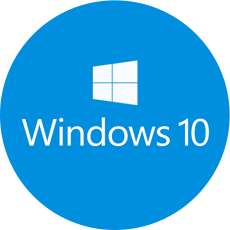The Ultimate Guide to Microsoft Windows 10 Troubleshooting
The Ultimate Guide
to Microsoft Windows 10 Troubleshooting
 This is the most extensive and comprehensive guide to troubleshooting and solving common problems in Windows 10. From simple issues like customizing your Start menu to complex solutions for fixing the Blue Screen of Death – we have you covered! The guides are thorough, proven, easy-to-follow and supported with helpful screenshots that will guide you through every step of the process.
We’ve structured the guide into 15 distinctive chapters – each dealing with the problems related to a specific topic.
This is the most extensive and comprehensive guide to troubleshooting and solving common problems in Windows 10. From simple issues like customizing your Start menu to complex solutions for fixing the Blue Screen of Death – we have you covered! The guides are thorough, proven, easy-to-follow and supported with helpful screenshots that will guide you through every step of the process.
We’ve structured the guide into 15 distinctive chapters – each dealing with the problems related to a specific topic.
 This is the most extensive and comprehensive guide to troubleshooting and solving common problems in Windows 10. From simple issues like customizing your Start menu to complex solutions for fixing the Blue Screen of Death – we have you covered! The guides are thorough, proven, easy-to-follow and supported with helpful screenshots that will guide you through every step of the process.
This is the most extensive and comprehensive guide to troubleshooting and solving common problems in Windows 10. From simple issues like customizing your Start menu to complex solutions for fixing the Blue Screen of Death – we have you covered! The guides are thorough, proven, easy-to-follow and supported with helpful screenshots that will guide you through every step of the process.
We’ve structured the guide into 15 distinctive chapters – each dealing with the problems related to a specific topic.
Installing, Updating and Activating Windows 10
Our first  chapter is dedicated to the very beginning of the user’s experience – the installation process. We’ve carefully crafted a step-by-step guide to show you how you can install Windows 10 on your computer by sharing our best practices.
We’ve created a separate instruction step that depends on your previous OS: Windows 7, Windows Vista or Windows XP. These should make you feel right at home! However, if you’re installing Windows 10 on a new computer, then just follow our guide to perform a clean installation.
Of course, there’s quite a few things that could go wrong during the installation, so we’ve covered the most common problems and errors as well.
Since the updating and activating processes are closely related to the installation itself, we’ve included these topics too. Is your Windows Update program crashing? Are you having trouble entering your license key? Don’t worry, we’ve thought about everything.
chapter is dedicated to the very beginning of the user’s experience – the installation process. We’ve carefully crafted a step-by-step guide to show you how you can install Windows 10 on your computer by sharing our best practices.
We’ve created a separate instruction step that depends on your previous OS: Windows 7, Windows Vista or Windows XP. These should make you feel right at home! However, if you’re installing Windows 10 on a new computer, then just follow our guide to perform a clean installation.
Of course, there’s quite a few things that could go wrong during the installation, so we’ve covered the most common problems and errors as well.
Since the updating and activating processes are closely related to the installation itself, we’ve included these topics too. Is your Windows Update program crashing? Are you having trouble entering your license key? Don’t worry, we’ve thought about everything.
Our first  chapter is dedicated to the very beginning of the user’s experience – the installation process. We’ve carefully crafted a step-by-step guide to show you how you can install Windows 10 on your computer by sharing our best practices.
chapter is dedicated to the very beginning of the user’s experience – the installation process. We’ve carefully crafted a step-by-step guide to show you how you can install Windows 10 on your computer by sharing our best practices.
 chapter is dedicated to the very beginning of the user’s experience – the installation process. We’ve carefully crafted a step-by-step guide to show you how you can install Windows 10 on your computer by sharing our best practices.
chapter is dedicated to the very beginning of the user’s experience – the installation process. We’ve carefully crafted a step-by-step guide to show you how you can install Windows 10 on your computer by sharing our best practices.
We’ve created a separate instruction step that depends on your previous OS: Windows 7, Windows Vista or Windows XP. These should make you feel right at home! However, if you’re installing Windows 10 on a new computer, then just follow our guide to perform a clean installation.
Of course, there’s quite a few things that could go wrong during the installation, so we’ve covered the most common problems and errors as well.
Since the updating and activating processes are closely related to the installation itself, we’ve included these topics too. Is your Windows Update program crashing? Are you having trouble entering your license key? Don’t worry, we’ve thought about everything.
Input Troubleshooting in Windows 10
Input devices  allow us to communicate with the computer, and Windows 8 has certainly revolutionized how we input data by including amazing support for touch screen devices – Windows 10 has kept almost all of it. However, due to the large spectrum of input devices that Microsoft’s OS has to support, there are bound to be issues. We’ve grouped them by the type of device in question: touch-screen and touch devices, mouse and keyboard.
This separation will make it easier for you to quickly find a solution for your input device. We also recognize that problems vary for wired and wireless devices, which is why each has its own distinctive section and approach.
allow us to communicate with the computer, and Windows 8 has certainly revolutionized how we input data by including amazing support for touch screen devices – Windows 10 has kept almost all of it. However, due to the large spectrum of input devices that Microsoft’s OS has to support, there are bound to be issues. We’ve grouped them by the type of device in question: touch-screen and touch devices, mouse and keyboard.
This separation will make it easier for you to quickly find a solution for your input device. We also recognize that problems vary for wired and wireless devices, which is why each has its own distinctive section and approach.
Input devices  allow us to communicate with the computer, and Windows 8 has certainly revolutionized how we input data by including amazing support for touch screen devices – Windows 10 has kept almost all of it. However, due to the large spectrum of input devices that Microsoft’s OS has to support, there are bound to be issues. We’ve grouped them by the type of device in question: touch-screen and touch devices, mouse and keyboard.
allow us to communicate with the computer, and Windows 8 has certainly revolutionized how we input data by including amazing support for touch screen devices – Windows 10 has kept almost all of it. However, due to the large spectrum of input devices that Microsoft’s OS has to support, there are bound to be issues. We’ve grouped them by the type of device in question: touch-screen and touch devices, mouse and keyboard.
 allow us to communicate with the computer, and Windows 8 has certainly revolutionized how we input data by including amazing support for touch screen devices – Windows 10 has kept almost all of it. However, due to the large spectrum of input devices that Microsoft’s OS has to support, there are bound to be issues. We’ve grouped them by the type of device in question: touch-screen and touch devices, mouse and keyboard.
allow us to communicate with the computer, and Windows 8 has certainly revolutionized how we input data by including amazing support for touch screen devices – Windows 10 has kept almost all of it. However, due to the large spectrum of input devices that Microsoft’s OS has to support, there are bound to be issues. We’ve grouped them by the type of device in question: touch-screen and touch devices, mouse and keyboard.
This separation will make it easier for you to quickly find a solution for your input device. We also recognize that problems vary for wired and wireless devices, which is why each has its own distinctive section and approach.
Devices and Drivers in Windows 10
Drivers are  software that function as a translator between your operating system and various devices that are connected to your computer. Each device has a driver that allows it to communicate with the operating system. As such, this software is essential and without it your device will not function properly.
Users have always had trouble with drivers as there are a lot of potential problems surrounding them: complex installation, missing files, corrupted data, etc. For this reason, we had to cover all grounds. Our guide will teach you how to use the Device Manager and find, install, or update missing drivers.
For your convenience, we’ve grouped the guides based on the types of devices: printers, monitors, wired devices, and wirelesses devices. Besides that, we have a special section for problems that are specifically related to USB devices that follow the plug-and-play model.
software that function as a translator between your operating system and various devices that are connected to your computer. Each device has a driver that allows it to communicate with the operating system. As such, this software is essential and without it your device will not function properly.
Users have always had trouble with drivers as there are a lot of potential problems surrounding them: complex installation, missing files, corrupted data, etc. For this reason, we had to cover all grounds. Our guide will teach you how to use the Device Manager and find, install, or update missing drivers.
For your convenience, we’ve grouped the guides based on the types of devices: printers, monitors, wired devices, and wirelesses devices. Besides that, we have a special section for problems that are specifically related to USB devices that follow the plug-and-play model.
Drivers are  software that function as a translator between your operating system and various devices that are connected to your computer. Each device has a driver that allows it to communicate with the operating system. As such, this software is essential and without it your device will not function properly.
software that function as a translator between your operating system and various devices that are connected to your computer. Each device has a driver that allows it to communicate with the operating system. As such, this software is essential and without it your device will not function properly.
 software that function as a translator between your operating system and various devices that are connected to your computer. Each device has a driver that allows it to communicate with the operating system. As such, this software is essential and without it your device will not function properly.
software that function as a translator between your operating system and various devices that are connected to your computer. Each device has a driver that allows it to communicate with the operating system. As such, this software is essential and without it your device will not function properly.
Users have always had trouble with drivers as there are a lot of potential problems surrounding them: complex installation, missing files, corrupted data, etc. For this reason, we had to cover all grounds. Our guide will teach you how to use the Device Manager and find, install, or update missing drivers.
For your convenience, we’ve grouped the guides based on the types of devices: printers, monitors, wired devices, and wirelesses devices. Besides that, we have a special section for problems that are specifically related to USB devices that follow the plug-and-play model.
Windows 10 Personalization
Our personalization  guide is meant to help you with a painless transition to Windows 10 and the new user interface. If you’re used to the design of Windows 7 then this new design might seem familiar.
However, our personalization guide will help you understand the new interface and how you can customize it to fit your style. Since you can use new interface with two different screens – the Desktop and the Start Screen – we’ve included a guide on how both of these can be customized and adjusted.
guide is meant to help you with a painless transition to Windows 10 and the new user interface. If you’re used to the design of Windows 7 then this new design might seem familiar.
However, our personalization guide will help you understand the new interface and how you can customize it to fit your style. Since you can use new interface with two different screens – the Desktop and the Start Screen – we’ve included a guide on how both of these can be customized and adjusted.
Our personalization  guide is meant to help you with a painless transition to Windows 10 and the new user interface. If you’re used to the design of Windows 7 then this new design might seem familiar.
guide is meant to help you with a painless transition to Windows 10 and the new user interface. If you’re used to the design of Windows 7 then this new design might seem familiar.
 guide is meant to help you with a painless transition to Windows 10 and the new user interface. If you’re used to the design of Windows 7 then this new design might seem familiar.
guide is meant to help you with a painless transition to Windows 10 and the new user interface. If you’re used to the design of Windows 7 then this new design might seem familiar.
However, our personalization guide will help you understand the new interface and how you can customize it to fit your style. Since you can use new interface with two different screens – the Desktop and the Start Screen – we’ve included a guide on how both of these can be customized and adjusted.
Ease of Access in Windows 10
Over the  years Microsoft has always included accessibility products and technologies into their operating systems. These Ease of Access features have been further improved in Windows 10 and they provide a complete suite of accessibility tools.
Our guide will teach you how to set up, configure and use these features. These tools include a powerful narrator that can read text, a magnifier that can enlarge content, a speech recognition tool for dictation and navigation, and a powerful set of clear visual cues that can replace sound effects and notifications.
As such, these tools can be very helpful to the elderly, people with physical disabilities, people who are visually impaired, or those with a hearing impairment.
years Microsoft has always included accessibility products and technologies into their operating systems. These Ease of Access features have been further improved in Windows 10 and they provide a complete suite of accessibility tools.
Our guide will teach you how to set up, configure and use these features. These tools include a powerful narrator that can read text, a magnifier that can enlarge content, a speech recognition tool for dictation and navigation, and a powerful set of clear visual cues that can replace sound effects and notifications.
As such, these tools can be very helpful to the elderly, people with physical disabilities, people who are visually impaired, or those with a hearing impairment.
Over the  years Microsoft has always included accessibility products and technologies into their operating systems. These Ease of Access features have been further improved in Windows 10 and they provide a complete suite of accessibility tools.
years Microsoft has always included accessibility products and technologies into their operating systems. These Ease of Access features have been further improved in Windows 10 and they provide a complete suite of accessibility tools.
 years Microsoft has always included accessibility products and technologies into their operating systems. These Ease of Access features have been further improved in Windows 10 and they provide a complete suite of accessibility tools.
years Microsoft has always included accessibility products and technologies into their operating systems. These Ease of Access features have been further improved in Windows 10 and they provide a complete suite of accessibility tools.
Our guide will teach you how to set up, configure and use these features. These tools include a powerful narrator that can read text, a magnifier that can enlarge content, a speech recognition tool for dictation and navigation, and a powerful set of clear visual cues that can replace sound effects and notifications.
As such, these tools can be very helpful to the elderly, people with physical disabilities, people who are visually impaired, or those with a hearing impairment.
Accounts, Security and Privacy
Account management  has changed greatly with the introduction of Microsoft accounts in Windows 10. Our guide is meant to help you learn what’s changed and how you can administrate multiple users on your PC. We’ve also written an in-depth guide on creating specialized Child accounts for your kids. These allow you to set limits and monitor their PC usage.
We’ve also covered the basics of how to keep your account safe and secure. Viruses can endanger the integrity of your PC and cause serious problems, while malware programs can be a major threat to your privacy. Luckily, Windows 10 comes with all the tools needed to protect your PC from these threats.
has changed greatly with the introduction of Microsoft accounts in Windows 10. Our guide is meant to help you learn what’s changed and how you can administrate multiple users on your PC. We’ve also written an in-depth guide on creating specialized Child accounts for your kids. These allow you to set limits and monitor their PC usage.
We’ve also covered the basics of how to keep your account safe and secure. Viruses can endanger the integrity of your PC and cause serious problems, while malware programs can be a major threat to your privacy. Luckily, Windows 10 comes with all the tools needed to protect your PC from these threats.
Account management  has changed greatly with the introduction of Microsoft accounts in Windows 10. Our guide is meant to help you learn what’s changed and how you can administrate multiple users on your PC. We’ve also written an in-depth guide on creating specialized Child accounts for your kids. These allow you to set limits and monitor their PC usage.
has changed greatly with the introduction of Microsoft accounts in Windows 10. Our guide is meant to help you learn what’s changed and how you can administrate multiple users on your PC. We’ve also written an in-depth guide on creating specialized Child accounts for your kids. These allow you to set limits and monitor their PC usage.
 has changed greatly with the introduction of Microsoft accounts in Windows 10. Our guide is meant to help you learn what’s changed and how you can administrate multiple users on your PC. We’ve also written an in-depth guide on creating specialized Child accounts for your kids. These allow you to set limits and monitor their PC usage.
has changed greatly with the introduction of Microsoft accounts in Windows 10. Our guide is meant to help you learn what’s changed and how you can administrate multiple users on your PC. We’ve also written an in-depth guide on creating specialized Child accounts for your kids. These allow you to set limits and monitor their PC usage.
We’ve also covered the basics of how to keep your account safe and secure. Viruses can endanger the integrity of your PC and cause serious problems, while malware programs can be a major threat to your privacy. Luckily, Windows 10 comes with all the tools needed to protect your PC from these threats.
Cortana, Microsoft Edge, Network and Web Troubleshooting
Network problems  are some of the most common issues that users face. If you frequently carry your device to different locations, and because of that have to switch between networks, you are likely to run into a problem or two. However, the term “network troubleshooting” is very ambiguous. To avoid confusion, we provided a very clear categorization to make it easier for you to find a solution to your problem.
Accordingly, this guide covers a whole range of problems for wireless networks, wired networks, local networks and Home Groups, and problems that are specifically related to the Microsoft Edge browser.
Using our advice on troubleshooting, you will be able to diagnose and resolve your network problems. However, bear in mind that certain issues might need to be resolved by your Internet Service Provider or the system administrator. If this is the case, it is a good idea to follow our advice and collect as much data about a certain problem as possible. This will, in turn, help the support center to quickly resolve your issue.
We have also covered the newest addition to the PC version of a Microsoft operating system: Cortana. As a virtual AI assistant, she will help your scheduling, travel, communication, research, reminders and a lot more with voice control or typing.
are some of the most common issues that users face. If you frequently carry your device to different locations, and because of that have to switch between networks, you are likely to run into a problem or two. However, the term “network troubleshooting” is very ambiguous. To avoid confusion, we provided a very clear categorization to make it easier for you to find a solution to your problem.
Accordingly, this guide covers a whole range of problems for wireless networks, wired networks, local networks and Home Groups, and problems that are specifically related to the Microsoft Edge browser.
Using our advice on troubleshooting, you will be able to diagnose and resolve your network problems. However, bear in mind that certain issues might need to be resolved by your Internet Service Provider or the system administrator. If this is the case, it is a good idea to follow our advice and collect as much data about a certain problem as possible. This will, in turn, help the support center to quickly resolve your issue.
We have also covered the newest addition to the PC version of a Microsoft operating system: Cortana. As a virtual AI assistant, she will help your scheduling, travel, communication, research, reminders and a lot more with voice control or typing.
Network problems  are some of the most common issues that users face. If you frequently carry your device to different locations, and because of that have to switch between networks, you are likely to run into a problem or two. However, the term “network troubleshooting” is very ambiguous. To avoid confusion, we provided a very clear categorization to make it easier for you to find a solution to your problem.
are some of the most common issues that users face. If you frequently carry your device to different locations, and because of that have to switch between networks, you are likely to run into a problem or two. However, the term “network troubleshooting” is very ambiguous. To avoid confusion, we provided a very clear categorization to make it easier for you to find a solution to your problem.
 are some of the most common issues that users face. If you frequently carry your device to different locations, and because of that have to switch between networks, you are likely to run into a problem or two. However, the term “network troubleshooting” is very ambiguous. To avoid confusion, we provided a very clear categorization to make it easier for you to find a solution to your problem.
are some of the most common issues that users face. If you frequently carry your device to different locations, and because of that have to switch between networks, you are likely to run into a problem or two. However, the term “network troubleshooting” is very ambiguous. To avoid confusion, we provided a very clear categorization to make it easier for you to find a solution to your problem.
Accordingly, this guide covers a whole range of problems for wireless networks, wired networks, local networks and Home Groups, and problems that are specifically related to the Microsoft Edge browser.
Using our advice on troubleshooting, you will be able to diagnose and resolve your network problems. However, bear in mind that certain issues might need to be resolved by your Internet Service Provider or the system administrator. If this is the case, it is a good idea to follow our advice and collect as much data about a certain problem as possible. This will, in turn, help the support center to quickly resolve your issue.
We have also covered the newest addition to the PC version of a Microsoft operating system: Cortana. As a virtual AI assistant, she will help your scheduling, travel, communication, research, reminders and a lot more with voice control or typing.
Email and Communication
Of all  the tasks that we perform on our computers daily, communication is certainly one of the most common. This chapter is dedicated to solving technical problems you might have while communicating with your colleagues, friends or family. As such, it is divided into two distinct groups: problems related to your email account (either in the Mail App or on Outlook.com) and problems related to Skype (Microsoft’s instant-messaging and VoIP software).
The first part of the guide includes advice on how to configure IMAP and POP in order to connect your Outlook.com account with Gmail, Yahoo, or other email providers. We also have an in-depth guide on how to use the Windows Mail App and resolve potential problems.
The second part focuses on how to solve common problems with Skype. These include sign-in and update errors, problems with poor call quality, and how to troubleshoot hardware, such as your microphone, headset or web cam, in case it is not being recognized by Skype.
the tasks that we perform on our computers daily, communication is certainly one of the most common. This chapter is dedicated to solving technical problems you might have while communicating with your colleagues, friends or family. As such, it is divided into two distinct groups: problems related to your email account (either in the Mail App or on Outlook.com) and problems related to Skype (Microsoft’s instant-messaging and VoIP software).
The first part of the guide includes advice on how to configure IMAP and POP in order to connect your Outlook.com account with Gmail, Yahoo, or other email providers. We also have an in-depth guide on how to use the Windows Mail App and resolve potential problems.
The second part focuses on how to solve common problems with Skype. These include sign-in and update errors, problems with poor call quality, and how to troubleshoot hardware, such as your microphone, headset or web cam, in case it is not being recognized by Skype.
Of all  the tasks that we perform on our computers daily, communication is certainly one of the most common. This chapter is dedicated to solving technical problems you might have while communicating with your colleagues, friends or family. As such, it is divided into two distinct groups: problems related to your email account (either in the Mail App or on Outlook.com) and problems related to Skype (Microsoft’s instant-messaging and VoIP software).
the tasks that we perform on our computers daily, communication is certainly one of the most common. This chapter is dedicated to solving technical problems you might have while communicating with your colleagues, friends or family. As such, it is divided into two distinct groups: problems related to your email account (either in the Mail App or on Outlook.com) and problems related to Skype (Microsoft’s instant-messaging and VoIP software).
 the tasks that we perform on our computers daily, communication is certainly one of the most common. This chapter is dedicated to solving technical problems you might have while communicating with your colleagues, friends or family. As such, it is divided into two distinct groups: problems related to your email account (either in the Mail App or on Outlook.com) and problems related to Skype (Microsoft’s instant-messaging and VoIP software).
the tasks that we perform on our computers daily, communication is certainly one of the most common. This chapter is dedicated to solving technical problems you might have while communicating with your colleagues, friends or family. As such, it is divided into two distinct groups: problems related to your email account (either in the Mail App or on Outlook.com) and problems related to Skype (Microsoft’s instant-messaging and VoIP software).
The first part of the guide includes advice on how to configure IMAP and POP in order to connect your Outlook.com account with Gmail, Yahoo, or other email providers. We also have an in-depth guide on how to use the Windows Mail App and resolve potential problems.
The second part focuses on how to solve common problems with Skype. These include sign-in and update errors, problems with poor call quality, and how to troubleshoot hardware, such as your microphone, headset or web cam, in case it is not being recognized by Skype.
Music, Photos and Videos
Everyone loves  to listen to their favorite artists, go through their old photo albums, or enjoy a good movie. Audio files, photos and videos are the most common media formats that we use on a daily basis. Usually it is very easy to work with these files and no special instructions are needed, but users can encounter certain problems with their hardware or some of the more advanced software features that Windows offer.
When it comes to hardware problems, the guide focuses on solving issues directly involving audio devices (such as speakers, audio cards, HDMI cables, and headphones) or recording live TV. As far as software goes, the guide focuses on how to install missing codecs, import photos and videos, and how to successfully sync devices using Windows Media Centre.
to listen to their favorite artists, go through their old photo albums, or enjoy a good movie. Audio files, photos and videos are the most common media formats that we use on a daily basis. Usually it is very easy to work with these files and no special instructions are needed, but users can encounter certain problems with their hardware or some of the more advanced software features that Windows offer.
When it comes to hardware problems, the guide focuses on solving issues directly involving audio devices (such as speakers, audio cards, HDMI cables, and headphones) or recording live TV. As far as software goes, the guide focuses on how to install missing codecs, import photos and videos, and how to successfully sync devices using Windows Media Centre.
Everyone loves  to listen to their favorite artists, go through their old photo albums, or enjoy a good movie. Audio files, photos and videos are the most common media formats that we use on a daily basis. Usually it is very easy to work with these files and no special instructions are needed, but users can encounter certain problems with their hardware or some of the more advanced software features that Windows offer.
to listen to their favorite artists, go through their old photo albums, or enjoy a good movie. Audio files, photos and videos are the most common media formats that we use on a daily basis. Usually it is very easy to work with these files and no special instructions are needed, but users can encounter certain problems with their hardware or some of the more advanced software features that Windows offer.
 to listen to their favorite artists, go through their old photo albums, or enjoy a good movie. Audio files, photos and videos are the most common media formats that we use on a daily basis. Usually it is very easy to work with these files and no special instructions are needed, but users can encounter certain problems with their hardware or some of the more advanced software features that Windows offer.
to listen to their favorite artists, go through their old photo albums, or enjoy a good movie. Audio files, photos and videos are the most common media formats that we use on a daily basis. Usually it is very easy to work with these files and no special instructions are needed, but users can encounter certain problems with their hardware or some of the more advanced software features that Windows offer.
When it comes to hardware problems, the guide focuses on solving issues directly involving audio devices (such as speakers, audio cards, HDMI cables, and headphones) or recording live TV. As far as software goes, the guide focuses on how to install missing codecs, import photos and videos, and how to successfully sync devices using Windows Media Centre.
Applications and the Windows Store
The Windows  Store and Windows applications (referred to as Apps) are new concepts that Microsoft has introduced in Windows 10. However, the basic principles will be familiar to anyone who has ever used a Smartphone.
This guide offers solutions to common problems and errors that can be experienced while using the Windows Store or any of the Apps. We’ve also covered some common how-to questions that are asked by the community on a daily basis. Parents will appreciate our guide on using the Family Safety Feature to monitor and block Apps that their kids have access to. We’ll also show you how to handle billing and payments, and how to install your Apps on multiple PCs or Microsoft accounts.
Store and Windows applications (referred to as Apps) are new concepts that Microsoft has introduced in Windows 10. However, the basic principles will be familiar to anyone who has ever used a Smartphone.
This guide offers solutions to common problems and errors that can be experienced while using the Windows Store or any of the Apps. We’ve also covered some common how-to questions that are asked by the community on a daily basis. Parents will appreciate our guide on using the Family Safety Feature to monitor and block Apps that their kids have access to. We’ll also show you how to handle billing and payments, and how to install your Apps on multiple PCs or Microsoft accounts.
The Windows  Store and Windows applications (referred to as Apps) are new concepts that Microsoft has introduced in Windows 10. However, the basic principles will be familiar to anyone who has ever used a Smartphone.
Store and Windows applications (referred to as Apps) are new concepts that Microsoft has introduced in Windows 10. However, the basic principles will be familiar to anyone who has ever used a Smartphone.
 Store and Windows applications (referred to as Apps) are new concepts that Microsoft has introduced in Windows 10. However, the basic principles will be familiar to anyone who has ever used a Smartphone.
Store and Windows applications (referred to as Apps) are new concepts that Microsoft has introduced in Windows 10. However, the basic principles will be familiar to anyone who has ever used a Smartphone.
This guide offers solutions to common problems and errors that can be experienced while using the Windows Store or any of the Apps. We’ve also covered some common how-to questions that are asked by the community on a daily basis. Parents will appreciate our guide on using the Family Safety Feature to monitor and block Apps that their kids have access to. We’ll also show you how to handle billing and payments, and how to install your Apps on multiple PCs or Microsoft accounts.
File and Folders
The basics  of files and folders in Windows 10 have not changed drastically in comparison to other versions of this operating system. Because of that, this guide does not include these concepts. Instead, we’ve covered possible problems (and solutions) to common errors, and examined some advanced topics such as how to navigate and work with the AppData folder.
Another interesting topic discussed in this guide is the Recycle Bin and some new ways to customize and configure this well-known feature. Sharing files and folders also works a bit differently, so it is explained in detail.
of files and folders in Windows 10 have not changed drastically in comparison to other versions of this operating system. Because of that, this guide does not include these concepts. Instead, we’ve covered possible problems (and solutions) to common errors, and examined some advanced topics such as how to navigate and work with the AppData folder.
Another interesting topic discussed in this guide is the Recycle Bin and some new ways to customize and configure this well-known feature. Sharing files and folders also works a bit differently, so it is explained in detail.
The basics  of files and folders in Windows 10 have not changed drastically in comparison to other versions of this operating system. Because of that, this guide does not include these concepts. Instead, we’ve covered possible problems (and solutions) to common errors, and examined some advanced topics such as how to navigate and work with the AppData folder.
of files and folders in Windows 10 have not changed drastically in comparison to other versions of this operating system. Because of that, this guide does not include these concepts. Instead, we’ve covered possible problems (and solutions) to common errors, and examined some advanced topics such as how to navigate and work with the AppData folder.
 of files and folders in Windows 10 have not changed drastically in comparison to other versions of this operating system. Because of that, this guide does not include these concepts. Instead, we’ve covered possible problems (and solutions) to common errors, and examined some advanced topics such as how to navigate and work with the AppData folder.
of files and folders in Windows 10 have not changed drastically in comparison to other versions of this operating system. Because of that, this guide does not include these concepts. Instead, we’ve covered possible problems (and solutions) to common errors, and examined some advanced topics such as how to navigate and work with the AppData folder.
Another interesting topic discussed in this guide is the Recycle Bin and some new ways to customize and configure this well-known feature. Sharing files and folders also works a bit differently, so it is explained in detail.
Online Storage with OneDrive
You’ve probably  heard of all the buzz around a term called “the cloud”. Everyone is getting in on it and Microsoft has their very own platform that’s called OneDrive. If you’ve ever used Google Drive or iCloud, you’ll probably be familiar with how it works. However, we’ve prefaced this section with an easy step-by-step introduction to OneDrive and how to use it.
After that, we’ve covered some advanced topics such as file sharing with OneDrive and how you can be in control of your privacy when using this service. There is also an extensive FAQ that covers a lot of potential problems you might run into.
heard of all the buzz around a term called “the cloud”. Everyone is getting in on it and Microsoft has their very own platform that’s called OneDrive. If you’ve ever used Google Drive or iCloud, you’ll probably be familiar with how it works. However, we’ve prefaced this section with an easy step-by-step introduction to OneDrive and how to use it.
After that, we’ve covered some advanced topics such as file sharing with OneDrive and how you can be in control of your privacy when using this service. There is also an extensive FAQ that covers a lot of potential problems you might run into.
You’ve probably  heard of all the buzz around a term called “the cloud”. Everyone is getting in on it and Microsoft has their very own platform that’s called OneDrive. If you’ve ever used Google Drive or iCloud, you’ll probably be familiar with how it works. However, we’ve prefaced this section with an easy step-by-step introduction to OneDrive and how to use it.
heard of all the buzz around a term called “the cloud”. Everyone is getting in on it and Microsoft has their very own platform that’s called OneDrive. If you’ve ever used Google Drive or iCloud, you’ll probably be familiar with how it works. However, we’ve prefaced this section with an easy step-by-step introduction to OneDrive and how to use it.
 heard of all the buzz around a term called “the cloud”. Everyone is getting in on it and Microsoft has their very own platform that’s called OneDrive. If you’ve ever used Google Drive or iCloud, you’ll probably be familiar with how it works. However, we’ve prefaced this section with an easy step-by-step introduction to OneDrive and how to use it.
heard of all the buzz around a term called “the cloud”. Everyone is getting in on it and Microsoft has their very own platform that’s called OneDrive. If you’ve ever used Google Drive or iCloud, you’ll probably be familiar with how it works. However, we’ve prefaced this section with an easy step-by-step introduction to OneDrive and how to use it.
After that, we’ve covered some advanced topics such as file sharing with OneDrive and how you can be in control of your privacy when using this service. There is also an extensive FAQ that covers a lot of potential problems you might run into.
Repair and Recovery
System repair  and file recovery are the issues an average user dreads and often tends to ignore until it’s too late. Dealing with these problems shouldn’t be put off, but you should proactively inform yourself on how to create a recovery disk and retrieve corrupted or lost files.
It’s exactly what this section is dedicated to. We’ve provided a look at the full process that is easy to follow and covers all the potential problems you might have while performing these tasks. You can expect to learn how to refresh, reset and restore your PC, create a recovery drive, use File History, and how to troubleshoot system errors using the System Configuration tool.
and file recovery are the issues an average user dreads and often tends to ignore until it’s too late. Dealing with these problems shouldn’t be put off, but you should proactively inform yourself on how to create a recovery disk and retrieve corrupted or lost files.
It’s exactly what this section is dedicated to. We’ve provided a look at the full process that is easy to follow and covers all the potential problems you might have while performing these tasks. You can expect to learn how to refresh, reset and restore your PC, create a recovery drive, use File History, and how to troubleshoot system errors using the System Configuration tool.
System repair  and file recovery are the issues an average user dreads and often tends to ignore until it’s too late. Dealing with these problems shouldn’t be put off, but you should proactively inform yourself on how to create a recovery disk and retrieve corrupted or lost files.
and file recovery are the issues an average user dreads and often tends to ignore until it’s too late. Dealing with these problems shouldn’t be put off, but you should proactively inform yourself on how to create a recovery disk and retrieve corrupted or lost files.
 and file recovery are the issues an average user dreads and often tends to ignore until it’s too late. Dealing with these problems shouldn’t be put off, but you should proactively inform yourself on how to create a recovery disk and retrieve corrupted or lost files.
and file recovery are the issues an average user dreads and often tends to ignore until it’s too late. Dealing with these problems shouldn’t be put off, but you should proactively inform yourself on how to create a recovery disk and retrieve corrupted or lost files.
It’s exactly what this section is dedicated to. We’ve provided a look at the full process that is easy to follow and covers all the potential problems you might have while performing these tasks. You can expect to learn how to refresh, reset and restore your PC, create a recovery drive, use File History, and how to troubleshoot system errors using the System Configuration tool.
Maintenance and Performance Guide
In order  to ensure that your device is running smoothly, you need to put in a bit of effort when it comes to system maintenance and performance optimization. This does not require you to perform a tech-savvy process, since there are a lot of automated tools that do them for you. Your task is simply to be aware of them and use them properly when needed.
In this section you’ll learn why updates are important and how you can update your Windows 10 devices. We’ll also cover how you can optimize your hard drive, free-up storage space and use the Disk Cleanup utility. Laptop and mobile users will benefit from a section about optimizing battery power plans.
Also, if you’re interested in getting the most out of your device, we have an in-depth look at how Microsoft’s new Task Manager can be used to monitor and benchmark performance, block programs and optimize the boot process.
to ensure that your device is running smoothly, you need to put in a bit of effort when it comes to system maintenance and performance optimization. This does not require you to perform a tech-savvy process, since there are a lot of automated tools that do them for you. Your task is simply to be aware of them and use them properly when needed.
In this section you’ll learn why updates are important and how you can update your Windows 10 devices. We’ll also cover how you can optimize your hard drive, free-up storage space and use the Disk Cleanup utility. Laptop and mobile users will benefit from a section about optimizing battery power plans.
Also, if you’re interested in getting the most out of your device, we have an in-depth look at how Microsoft’s new Task Manager can be used to monitor and benchmark performance, block programs and optimize the boot process.
In order  to ensure that your device is running smoothly, you need to put in a bit of effort when it comes to system maintenance and performance optimization. This does not require you to perform a tech-savvy process, since there are a lot of automated tools that do them for you. Your task is simply to be aware of them and use them properly when needed.
to ensure that your device is running smoothly, you need to put in a bit of effort when it comes to system maintenance and performance optimization. This does not require you to perform a tech-savvy process, since there are a lot of automated tools that do them for you. Your task is simply to be aware of them and use them properly when needed.
 to ensure that your device is running smoothly, you need to put in a bit of effort when it comes to system maintenance and performance optimization. This does not require you to perform a tech-savvy process, since there are a lot of automated tools that do them for you. Your task is simply to be aware of them and use them properly when needed.
to ensure that your device is running smoothly, you need to put in a bit of effort when it comes to system maintenance and performance optimization. This does not require you to perform a tech-savvy process, since there are a lot of automated tools that do them for you. Your task is simply to be aware of them and use them properly when needed.
In this section you’ll learn why updates are important and how you can update your Windows 10 devices. We’ll also cover how you can optimize your hard drive, free-up storage space and use the Disk Cleanup utility. Laptop and mobile users will benefit from a section about optimizing battery power plans.
Also, if you’re interested in getting the most out of your device, we have an in-depth look at how Microsoft’s new Task Manager can be used to monitor and benchmark performance, block programs and optimize the boot process.
Troubleshooting Common Problems in Windows
In this  section we’ve covered some common problems that everyone who has ever used any version of Windows has seen at some point. These are dreaded errors such as “Unfortunately, Explorer.exe has stopped working”, the Blue Screen of Death, or unexpected errors that only appear in the form of hexadecimal code such as 0xc00003E9.
These are the types of problems that deserve their own section and we’re glad to say that we’ve provided a detailed look at what might cause these issues and how you can solve them. The guide is divided into three parts: solving problems with the File Explorer, how to fix the Blue Screen of Death, and an overview of common hexadecimal errors.
section we’ve covered some common problems that everyone who has ever used any version of Windows has seen at some point. These are dreaded errors such as “Unfortunately, Explorer.exe has stopped working”, the Blue Screen of Death, or unexpected errors that only appear in the form of hexadecimal code such as 0xc00003E9.
These are the types of problems that deserve their own section and we’re glad to say that we’ve provided a detailed look at what might cause these issues and how you can solve them. The guide is divided into three parts: solving problems with the File Explorer, how to fix the Blue Screen of Death, and an overview of common hexadecimal errors.
In this  section we’ve covered some common problems that everyone who has ever used any version of Windows has seen at some point. These are dreaded errors such as “Unfortunately, Explorer.exe has stopped working”, the Blue Screen of Death, or unexpected errors that only appear in the form of hexadecimal code such as 0xc00003E9.
section we’ve covered some common problems that everyone who has ever used any version of Windows has seen at some point. These are dreaded errors such as “Unfortunately, Explorer.exe has stopped working”, the Blue Screen of Death, or unexpected errors that only appear in the form of hexadecimal code such as 0xc00003E9.
 section we’ve covered some common problems that everyone who has ever used any version of Windows has seen at some point. These are dreaded errors such as “Unfortunately, Explorer.exe has stopped working”, the Blue Screen of Death, or unexpected errors that only appear in the form of hexadecimal code such as 0xc00003E9.
section we’ve covered some common problems that everyone who has ever used any version of Windows has seen at some point. These are dreaded errors such as “Unfortunately, Explorer.exe has stopped working”, the Blue Screen of Death, or unexpected errors that only appear in the form of hexadecimal code such as 0xc00003E9.
These are the types of problems that deserve their own section and we’re glad to say that we’ve provided a detailed look at what might cause these issues and how you can solve them. The guide is divided into three parts: solving problems with the File Explorer, how to fix the Blue Screen of Death, and an overview of common hexadecimal errors.
